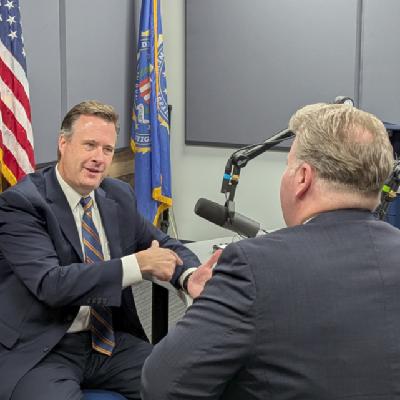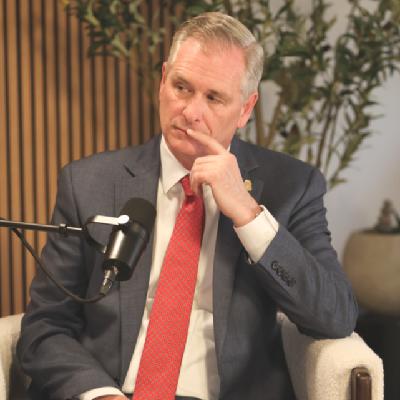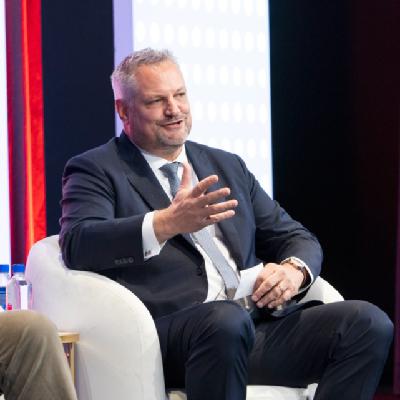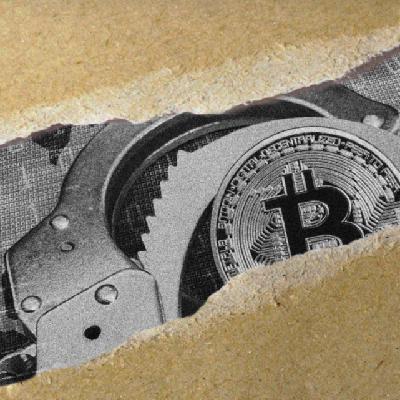Discover Public Key
Public Key

Public Key
Author: Chainalysis
Subscribed: 53Played: 1,996Subscribe
Share
© Copyright 2026 All Rights Reserved
Description
Public Key is the cryptocurrency and compliance podcast, brought to you by Chainalysis.
Every week Chainalysis Chief Marketing Officer, Ian Andrews sits down with thought leaders in the space to discuss:
▪Emerging risks and opportunities in blockchain technology
▪How policymakers around the world are approaching cryptoregulations
▪Data-driven insights into the latest trends in crypto economics and crime.
▪Breaking news in the crypto market
Subscribe to be first to hear the Public Key podcast
You can also stay up to date with crypto news by reading the industry leading Chainalysis blog and subscribing to the Chainalysis newsletter: https://blog.chainalysis.com/
Follow Chainalysis on:
▪Twitter: https://twitter.com/chainalysis
▪LinkedIn: https://www.linkedin.com/company/10607336
To learn more about criminal activity in crypto including scams, money laundering, ransomware and more, download the 2022 Crypto Crime Report: https://go.chainalysis.com/2022-crypto-crime-report.html
To Keep Up With Ian Andrews, follow him on:
▪Twitter: https://twitter.com/IanAndrewsDC
▪LinkedIn: https://www.linkedin.com/in/ianhandrews
⚠Our podcasts are for informational purposes only, and are not intended to provide legal, tax, financial, or investment advice. Listeners should consult their own advisors before making these types of decisions. Chainalysis has no responsibility or liability for any decision made or any other acts or omissions in connection with your use of this material.
Chainalysis does not guarantee or warrant the accuracy, completeness, timeliness, suitability or validity of the information in any particular podcast and will not be responsible for any claim attributable to errors, omissions, or other inaccuracies of any part of such material.
Unless stated otherwise, reference to any specific product or entity does not constitute an endorsement or recommendation by Chainalysis. The views expressed by guests are their own and their appearance on the program does not imply an endorsement of them or any entity they represent. Views and opinions expressed by Chainalysis employees are those of the employees and do not necessarily reflect the views of the company.
Every week Chainalysis Chief Marketing Officer, Ian Andrews sits down with thought leaders in the space to discuss:
▪Emerging risks and opportunities in blockchain technology
▪How policymakers around the world are approaching cryptoregulations
▪Data-driven insights into the latest trends in crypto economics and crime.
▪Breaking news in the crypto market
Subscribe to be first to hear the Public Key podcast
You can also stay up to date with crypto news by reading the industry leading Chainalysis blog and subscribing to the Chainalysis newsletter: https://blog.chainalysis.com/
Follow Chainalysis on:
▪Twitter: https://twitter.com/chainalysis
▪LinkedIn: https://www.linkedin.com/company/10607336
To learn more about criminal activity in crypto including scams, money laundering, ransomware and more, download the 2022 Crypto Crime Report: https://go.chainalysis.com/2022-crypto-crime-report.html
To Keep Up With Ian Andrews, follow him on:
▪Twitter: https://twitter.com/IanAndrewsDC
▪LinkedIn: https://www.linkedin.com/in/ianhandrews
⚠Our podcasts are for informational purposes only, and are not intended to provide legal, tax, financial, or investment advice. Listeners should consult their own advisors before making these types of decisions. Chainalysis has no responsibility or liability for any decision made or any other acts or omissions in connection with your use of this material.
Chainalysis does not guarantee or warrant the accuracy, completeness, timeliness, suitability or validity of the information in any particular podcast and will not be responsible for any claim attributable to errors, omissions, or other inaccuracies of any part of such material.
Unless stated otherwise, reference to any specific product or entity does not constitute an endorsement or recommendation by Chainalysis. The views expressed by guests are their own and their appearance on the program does not imply an endorsement of them or any entity they represent. Views and opinions expressed by Chainalysis employees are those of the employees and do not necessarily reflect the views of the company.
177 Episodes
Reverse
In the last year alone, IRS-CI identified more than $10 billion in financial crime executed over 1400 warrants, seized hundreds of millions of dollars in assets and maintained one of the highest conviction rates in federal law enforcement.
But how do they amass these groundbreaking stats? In this episode, Matt Wilson (Director, Product Strategy, Chainalysis) speaks with Trevor McAleenan (Acting Supervisory Special Agent, IRS-CI) and he provides unique insights into the division's accomplishments and their recent Annual Report.
The team discusses the evolving landscape of financial crime as cryptocurrency becomes a significant player, while shedding light on huge cases, including Armenian narcotics networks, and Chinese nationals peddling fentanyl precursors. The discussion also touches on the future of crimefighting in the world of AI and cryptocurrency, emphasizing the agency's global partnerships and strategic innovations.
Minute-by-minute episode breakdown
2 | Inside IRS Criminal Investigations and Major Cryptocurrency Seizures
4 | Trevor McAleenan's Dynamic Career in IRS Criminal Investigation
7 | The Evolution of Cryptocurrency in Criminal Investigations
10 | Major Crypto Cases and Successes for IRS-CI
14 | Seizing Cryptocurrency: Challenges and Unexpected Discoveries
18 | Cracking Down on Darknet Drug Trafficking Through Cryptocurrency
23 | AI and Cryptocurrency in Modern Criminal Investigations
27 | IRS-CI's Global Impact and Career Opportunities
Related resources
Check out more resources provided by Chainalysis that perfectly complement this episode of the Public Key.
Website: IRS Criminal Investigation (IRS-CI) serves the American public by investigating potential criminal violations of the Internal Revenue Code
Publication: IRS-CI 2025 Annual Report
Press Release: U.S. Attorney Announces Historic $3.36 Billion Cryptocurrency Seizure And Conviction In Connection With Silk Road Dark Web Fraud
Press Release: Bitfinex hacker sentenced in money laundering conspiracy involving billions in stolen cryptocurrency
Press Release: Bitcoin Fog Operator Sentenced for Money Laundering Conspiracy
Blog: North Korea Drives Record $2 Billion Crypto Theft Year, Pushing All-Time Total to $6.75 Billion
Blog: $35 Million in Crypto Drained in 15 Minutes: How Exchange Hacks Are Evolving and How to Prevent Them
YouTube: Chainalysis YouTube page
Twitter: Chainalysis Twitter: Building trust in blockchain
Speakers on today’s episode
Matt Wilson *Host* (Director, Product Strategy, Chainalysis)
Trevor McAleenan (Acting Supervisory Special Agent, IRS-CI)
This website may contain links to third-party sites that are not under the control of Chainalysis, Inc. or its affiliates (collectively “Chainalysis”). Access to such information does not imply association with, endorsement of, approval of, or recommendation by Chainalysis of the site or its operators, and Chainalysis is not responsible for the products, services, or other content hosted therein.
Our podcasts are for informational purposes only, and are not intended to provide legal, tax, financial, or investment advice. Listeners should consult their own advisors before making these types of decisions. Chainalysis has no responsibility or liability for any decision made or any other acts or omissions in connection with your use of this material.
Chainalysis does not guarantee or warrant the accuracy, completeness, timeliness, suitability or validity of the information in any particular podcast and will not be responsible for any claim attributable to errors, omissions, or other inaccuracies of any part of such material.
Unless stated otherwise, reference to any specific product or entity does not constitute an endorsement or recommendation by Chainalysis. The views expressed by guests are their own and their appearance on the program does not imply an endorsement of them or any entity they represent. Views and opinions expressed by Chainalysis employees are those of the employees and do not necessarily reflect the views of the company.
FATF has rolled out their most comprehensive guidance on asset recovery and the entire digital asset industry should take notice.
In this episode, Jim Lee (Global Head of Capacity Building, Chainalysis) talks with both, Aidan Larkin (Co-Founder & CEO, Asset Reality) and Hugo Hoyland (Chief Strategy Officer, Asset Reality) and leverages their transformative experiences and efforts toward developing efficient solutions for managing seized digital assets.
They outline the significant challenges faced by investigators globally, they are spearheading efforts to streamline asset recovery processes through innovative platforms like Asset Reality and highlighting the best practices mentioned by the renewed focus from international bodies like the FATF in their guidance
The trio discuss the importance of public private partnerships to bridge knowledge gaps and coordinate cross border recovery operations effectively and highlight partnerships with Operation Shamrock and the critical role that swift and capable asset management plays in the modern fight against financial crime.
Minute-by-minute episode breakdown
2 | Challenges and Innovations in Global Asset Recovery
5 | FATF Guidance and Importance of Seizures and Forfeitures in Investigations
10 | Improving Global Asset Recovery Through Effective Management Practices
14 | Challenges and Strategies in Digital Asset Seizure and Management
19 | Solutions in Government Asset Seizure Management
25 | Importance of Public Private Partnerships in Law Enforcement
29 | Private Sector's Role in Asset Recovery and Law Enforcement
32 | Global Success in Digital Asset Seizures and Financial Crime Expertise
39 | Complexities of Crypto Asset Seizure and Forfeiture
43 | Government Strategies for Liquidating Digital and Physical Assets
46 | Improving Global Asset Recovery and Standardizing Seized Asset Data
51 | Operation Shamrock and Asset Recovery in Crypto Investigations
Related resources
Check out more resources provided by Chainalysis that perfectly complement this episode of the Public Key.
Website: Asset Reality: One platform to seize and manage all assets
Publication: FATF releases detailed guidance to help practitioners recover criminal assets
Announcement: Asset Reality and Operation Shamrock Form Strategic Alliance to Build Law Enforcement Infrastructure to Seize & Manage Crypto Assets
Article: Operation Destabilise: NCA exposes billion-dollar money laundering network that purchased bank to fund Russian war effort
Blog: U.S., U.K., and Australia Target Russian Cybercrime Infrastructure Supporting Global Ransomware Operations; U.S. Targets Crypto Laundering of Global Drug Trafficking Network
Blog: FATF Issues Comprehensive Guidance on Virtual Asset Recovery: What Law Enforcement Needs to Know
YouTube: Chainalysis YouTube page
Twitter: Chainalysis Twitter: Building trust in blockchain
Speakers on today’s episode
Jim Lee ** Host** (Global Head of Capacity Building, Chainalysis)
Aidan Larkin (Co-Founder & CEO, Asset Reality)
Hugo Hoyland (Chief Strategy Officer, Asset Reality)
This website may contain links to third-party sites that are not under the control of Chainalysis, Inc. or its affiliates (collectively “Chainalysis”). Access to such information does not imply association with, endorsement of, approval of, or recommendation by Chainalysis of the site or its operators, and Chainalysis is not responsible for the products, services, or other content hosted therein.
Our podcasts are for informational purposes only, and are not intended to provide legal, tax, financial, or investment advice. Listeners should consult their own advisors before making these types of decisions. Chainalysis has no responsibility or liability for any decision made or any other acts or omissions in connection with your use of this material.
Chainalysis does not guarantee or warrant the accuracy, completeness, timeliness, suitability or validity of the information in any particular podcast and will not be responsible for any claim attributable to errors, omissions, or other inaccuracies of any part of such material.
Unless stated otherwise, reference to any specific product or entity does not constitute an endorsement or recommendation by Chainalysis. The views expressed by guests are their own and their appearance on the program does not imply an endorsement of them or any entity they represent. Views and opinions expressed by Chainalysis employees are those of the employees and do not necessarily reflect the views of the company.
$15 Billion crypto seizures, SouthEast Asia scam compounds with thousands of victims and the life savings of hard working professionals being wiped out by transnational criminal organizations. In this episode, Andrew Fierman (Head of National Security Intelligence, Chainalysis) and Erin West (Founder, Operation Shamrock), don’t hold back in sharing the nuances of pig butchering, national security and everything to do with crypto sanctions and victim support.
Erin describes the comprehensive scam strategies and shares her perspective as she travels the world and investigates steps away from some of the biggest scam compounds the industry has ever seen.
Andrew emphasizes the enormous scale of financial operations linked to illicit activities, evidenced by the staggering figures tied to entities like Huione and Prince Group and the importance of cross-sector collaboration and proactive regulatory measures in mitigating these threats.
Through real-life anecdotes and expert analysis, the episode provides listeners with a deeper understanding of the complexities and ongoing efforts to combat transnational organized scam networks.
Minute-by-minute episode breakdown
2 | Introduction: Crypto Natsec and Pig Butchering
4 | Erin's Background in High Tech Crime
8 | Understanding Pig Butchering Scams
15 | Global Collaboration Against Organized Crime
18 | Gift Cards as a Money Laundering Tool
22 | Southeast Asia Scam Compounds
27 | Chen Zhi and Prince Group’s Sanction Analysis
30 | Practical Advice on How Anyone Can Combat Pig Butchering
33 | Closing Thoughts and Resources
Related resources
Check out more resources provided by Chainalysis that perfectly complement this episode of the Public Key.
Website: Operation Shamrock: Educate. Mobilize. Disrupt: Stopping Scams Together
Podcast: Stolen: A Podcast with Erin West
Article: The Pig Butchering Lifecycle: Organized criminals use a highly scripted process and human trafficking to get as much money as they can from individual victims.
Article: How scammers use crypto ATMs to launder millions from victims
Blog: DOJ Seizes $15 Billion in Bitcoin as U.S. and U.K. Target Massive Southeast Asian Crypto Scam Network
Blog: Five Key Takeaways from MSMT’s Report on North Korean Cyber Operations
YouTube: Chainalysis YouTube page
Twitter: Chainalysis Twitter: Building trust in blockchain
Speakers on today’s episode
Andrew Fierman (Head of National Security Intelligence, Chainalysis)
Erin West (Founder, Operation Shamrock)
This website may contain links to third-party sites that are not under the control of Chainalysis, Inc. or its affiliates (collectively “Chainalysis”). Access to such information does not imply association with, endorsement of, approval of, or recommendation by Chainalysis of the site or its operators, and Chainalysis is not responsible for the products, services, or other content hosted therein.
Our podcasts are for informational purposes only, and are not intended to provide legal, tax, financial, or investment advice. Listeners should consult their own advisors before making these types of decisions. Chainalysis has no responsibility or liability for any decision made or any other acts or omissions in connection with your use of this material.
Chainalysis does not guarantee or warrant the accuracy, completeness, timeliness, suitability or validity of the information in any particular podcast and will not be responsible for any claim attributable to errors, omissions, or other inaccuracies of any part of such material.
Unless stated otherwise, reference to any specific product or entity does not constitute an endorsement or recommendation by Chainalysis. The views expressed by guests are their own and their appearance on the program does not imply an endorsement of them or any entity they represent. Views and opinions expressed by Chainalysis employees are those of the employees and do not necessarily reflect the views of the company.
The murder-for-hire case of Ron Ilg, seems like it was pulled directly from a Netflix documentary, but this is a real life case involving cryptocurrency and multiple FBI agents. Beth Bisbee (Director Product Strategy, Chainalysis Government Solutions) leads the discussion with the Supervisory Special Agent, Forensic Analyst and Special Agent that were tasked with this complex and riveting case.
This FBI-led investigation involving a murder-for-hire case facilitated via the dark web, featuring cryptocurrency payments, seed phrases on sticky pads, guns, cash and biometric safes.
The team details their journey, from the initial tip-off involving a custody dispute and an alleged plot to harm a spouse, to navigating the complexities of tracing cryptocurrency on the blockchain. The discussion zeros in on how the newly created Virtual Currency Response Team played a critical role in unraveling this case by leveraging blockchain analysis despite the perpetrator's attempts to obfuscate transactions using mixers. With cooperative efforts involving international exchanges and Bitcoin ATMS.
This gripping discussion highlights how the FBI team unraveled the complexities of the case using modern investigative techniques involving blockchain forensic analysis and traditional detective methods combined to thwart a potentially tragic crime.
Minute-by-minute episode breakdown
2 | FBI Agents Entrance To Crypto By Using It To Investigate Darknet Markets
5 | Exploring the Murder-For-Hire Case of Ron Ilg
8 | Introduction of the Virtual Currency Response (VCR) Team
12 | Major Breakthrough in Case When Reconstituting Crypto Wallets
17 | Connecting Intelligence From Exchanges and Bitcoin ATMs
22 | Main Accelerants in the Case That Drove Huge Results
25 | Finding the Seed Phrase Safe at Ron’s House Changed Dynamic of Case
29 | Challenges and Hurdles That Arose During the Investigation
33 | The FBI Leverages Previous Murder-For-Hire Case in Investigation
35 | Analyzing Ron Ilg’s Plea Deal and Sentencing
37 | The Biggest Takeaways for the FBI in this Crypto Investigation
Related resources
Check out more resources provided by Chainalysis that perfectly complement this episode of the Public Key.
Website: Mission First: To protect the American people and uphold the Constitution of the U.S.
Press Release: Former Spokane Neonatologist Pleads Guilty in Plot to Hire Multiple Hitmen to Kidnap His Estranged Wife and Assault a Former Colleague
Report Online Scams: Internet Crime Complaint Center (IC3) is the central hub for reporting cyber-enabled crime.
Blog: The 2025 Geography of Crypto Report (Download Now!)
Blog: DOJ Seizes $15 Billion in Bitcoin as U.S. and U.K. Target Massive Southeast Asian Crypto Scam Network
Blog: How Coinbase’s Proactive Fentanyl Investigation Sprint Disrupted Criminal Networks with Chainalysis Intelligence
YouTube: Chainalysis YouTube page
Twitter: Chainalysis Twitter: Building trust in blockchain
Speakers on today’s episode
Beth Bisbee (Director Product Strategy, Chainalysis Government Solutions)
Supervisory Special Agent (SSA), Federal Bureau of Investigation (FBI))
Special Agent (SA), Federal Bureau of Investigation (FBI))
Forensic Analyst, Federal Bureau of Investigation (FBI))
This website may contain links to third-party sites that are not under the control of Chainalysis, Inc. or its affiliates (collectively “Chainalysis”). Access to such information does not imply association with, endorsement of, approval of, or recommendation by Chainalysis of the site or its operators, and Chainalysis is not responsible for the products, services, or other content hosted therein.
Our podcasts are for informational purposes only, and are not intended to provide legal, tax, financial, or investment advice. Listeners should consult their own advisors before making these types of decisions. Chainalysis has no responsibility or liability for any decision made or any other acts or omissions in connection with your use of this material.
Chainalysis does not guarantee or warrant the accuracy, completeness, timeliness, suitability or validity of the information in any particular podcast and will not be responsible for any claim attributable to errors, omissions, or other inaccuracies of any part of such material.
Unless stated otherwise, reference to any specific product or entity does not constitute an endorsement or recommendation by Chainalysis. The views expressed by guests are their own and their appearance on the program does not imply an endorsement of them or any entity they represent. Views and opinions expressed by Chainalysis employees are those of the employees and do not necessarily reflect the views of the company.
The FBI created the Virtual Assets Unit to spearhead the agency’s efforts alongside a network of distributed experts to combat the misuse of digital currencies in criminal activity.
In this episode, Gurvais Grigg (former Chief Technology Officer, Global Public Sector, Chainalysis) gained insights from Patrick Wyman (Unit Chief - Virtual Assets Unit, Federal Bureau of Investigation (FBI)) into the intricacies of the FBI's approach to managing and monitoring virtual assets.
Patrick Wyman shares insights from his extensive career focused on white-collar crimes and articulates the critical importance of fostering collaboration among personnel and divisions, highlighting the unit's journey from a segmented array of expertise to a cohesive force capable of tackling financial crimes across all investigative areas.
This episode dissects the FBI's innovative strategies to maintain efficiency and agility amidst the rapidly evolving virtual asset landscape, but also highlights the challenges the public sector has in staying ahead of the crypto criminals.
Minute-by-minute episode breakdown
2 | Patrick's Journey at the FBI and Leading the Virtual Assets Unit
5 | Exploring FBI's Approach to Virtual Assets and White Collar Crime
8 | FBI's Virtual Assets Unit Unifies Expertise Across Divisions
12 | Enhancing Crypto Literacy and Leadership Engagement in the FBI
15 | Emerging Threat Typologies in Crypto Crime
19 | Managing Expertise and Resources in a Dynamic Environment
24 | Seizing Crypto Assets to Disrupt International Criminal Activities
29 | Challenges and Future of Cryptocurrency in Law Enforcement
33 | Building Sustainable Programs Through Strategic Planning and Growth
Related resources
Check out more resources provided by Chainalysis that perfectly complement this episode of the Public Key.
Website: Mission First: To protect the American people and uphold the Constitution of the U.S.
Press Release: ABA Foundation and FBI Release New Infographic to Help Americans Spot and Avoid Deepfake Scams
Blog: How Chainalysis Helped the FBI Track Down and Freeze Millions in the Caesars Casino Ransomware Attack
Article: United States Files Civil Forfeiture Complaint Against $225 Million in Funds Involved in Cryptocurrency Investment Fraud Money Laundering
Blog: The 2025 Geography of Crypto Report (Reserve Your Copy Now!)
Blog: DPRK IT Workers: Inside North Korea’s Crypto Laundering Network
Blog: Customer Spotlights: Hear from Zodia Custody, Grant Thornton and many more
YouTube: Chainalysis YouTube page
Twitter: Chainalysis Twitter: Building trust in blockchain
Speakers on today’s episode
Gurvais Grigg (former Chief Technology Officer, Global Public Sector, Chainalysis)
Patrick Wyman (Unit Chief - Virtual Assets Unit, Federal Bureau of Investigation (FBI))
This website may contain links to third-party sites that are not under the control of Chainalysis, Inc. or its affiliates (collectively “Chainalysis”). Access to such information does not imply association with, endorsement of, approval of, or recommendation by Chainalysis of the site or its operators, and Chainalysis is not responsible for the products, services, or other content hosted therein.
Our podcasts are for informational purposes only, and are not intended to provide legal, tax, financial, or investment advice. Listeners should consult their own advisors before making these types of decisions. Chainalysis has no responsibility or liability for any decision made or any other acts or omissions in connection with your use of this material.
Chainalysis does not guarantee or warrant the accuracy, completeness, timeliness, suitability or validity of the information in any particular podcast and will not be responsible for any claim attributable to errors, omissions, or other inaccuracies of any part of such material.
Unless stated otherwise, reference to any specific product or entity does not constitute an endorsement or recommendation by Chainalysis. The views expressed by guests are their own and their appearance on the program does not imply an endorsement of them or any entity they represent. Views and opinions expressed by Chainalysis employees are those of the employees and do not necessarily reflect the views of the company.
With over a decade of experience, James Barnacle (Deputy Assistant Director, Federal Bureau of Investigation (FBI)) joins Jonathan Levin (CEO & Co-founder, Chainalysis) for a deep dive into the nexus of cybercrime, cryptocurrency and the evolving challenges faced by law enforcement.
James shares insights into the history and progression of the FBI’s strategies in combating cryptocurrency-enabled crimes, shedding light on intricate cases involving ransomware, fraud, and terrorism financing.
This conversation goes in depth on the FBI’s approach to multi-agency cooperation, including the establishment of the Virtual Assets Unit and response teams across field offices and the importance of victim reporting when it comes to pig butchering and other crypto investment schemes.
This is an episode you won’t forget.
Minute-by-minute episode breakdown
2 | Background of James Barnacle
4 | Beginning of the FBI's Involvement with Cryptocurrency
7 | The Evolution of Cryptocurrency Use in Criminal Investigations
10 | Establishment of the Virtual Assets Unit in the FBI
14 | FBI’s Approach to Ransomware Investigations
20 | International Private Sector Collaboration and Strategy in Fraud Cases
25 | Addressing Elderly Fraud and Pig Butchering
31 | Impact of Sanctions on Fraud Prevention
37 | North Korea's Involvement in Cryptocurrency Theft
40 | Importance of AI and Machine Learning in Law Enforcement
48 | Encouragement for Public and Private Sector Cooperation
Related resources
Check out more resources provided by Chainalysis that perfectly complement this episode of the Public Key.
Website: Mission First: To protect the American people and uphold the Constitution of the U.S.
Press Release: Ransomware Administrator Charged with Cybercrimes for Deploying “Lockergoga,” “Nefilim,” and “Megacortex” Ransomware Strains Against Hundreds of Victims
Report: Operation Level Up: Notifying Victims of Crypto Investment Fraud
Blog: How Chainalysis Helped the FBI Track Down and Freeze Millions in the Caesars Casino Ransomware Attack
Blog: The 2025 Geography of Crypto Report (Reserve Your Copy Now!)
Blog: The Venus Protocol Incident: How Hexagate and a Community Stopped a Hack and Enabled a Swift Recovery
Blog: Seoul Police Crack International Hacking Ring with Chainalysis Solutions
YouTube: Chainalysis YouTube page
Twitter: Chainalysis Twitter: Building trust in blockchain
Speakers on today’s episode
Jonathan Levin (CEO & Co-founder, Chainalysis)
James Barnacle (Deputy Assistant Director, Federal Bureau of Investigation (FBI))
This website may contain links to third-party sites that are not under the control of Chainalysis, Inc. or its affiliates (collectively “Chainalysis”). Access to such information does not imply association with, endorsement of, approval of, or recommendation by Chainalysis of the site or its operators, and Chainalysis is not responsible for the products, services, or other content hosted therein.
Our podcasts are for informational purposes only, and are not intended to provide legal, tax, financial, or investment advice. Listeners should consult their own advisors before making these types of decisions. Chainalysis has no responsibility or liability for any decision made or any other acts or omissions in connection with your use of this material.
Chainalysis does not guarantee or warrant the accuracy, completeness, timeliness, suitability or validity of the information in any particular podcast and will not be responsible for any claim attributable to errors, omissions, or other inaccuracies of any part of such material.
Unless stated otherwise, reference to any specific product or entity does not constitute an endorsement or recommendation by Chainalysis. The views expressed by guests are their own and their appearance on the program does not imply an endorsement of them or any entity they represent. Views and opinions expressed by Chainalysis employees are those of the employees and do not necessarily reflect the views of the company.
The evolution of the cybercrime landscape in the UK has evolved rapidly and in this episode, Andrew Gould (Detective Chief Superintendent & Cybercrime Team Lead, National Police Chiefs' Council (NPCC)) shares deep insights with Jim Lee (Global Head of Capacity Building, Chainalysis) on how the NPCC has built their capacity in handling crypto investigations.
Andrew explains how his cybercrime unit has orchestrated a collaborative national response towards cyber threats and ransomware attacks and the strategic approaches towards building and enhancing investigative capabilities.
He discloses how government funding and developing training programs were instrumental in empowering officers against cyber threats and establishing partnerships with the private sector, Chainalysis and international law enforcement has been a key to their success.
Minute-by-minute episode breakdown
2 | Early Days of UK Cybercrime and Bitcoin
5 | Role of the National Police Chiefs’ Council in the UK
8 | Building a National Capability in Cybercrime
12 | Combining Blockchain Data with Other Data Sets
15 | Partnerships with Private Sector and Future Vision of Law Enforcement Collaborations
18 | Challenges and Best Practices in Building Crypto Capacity In Law Enforcement
23 |Future of Crypto Investigations - Looking Toward 2030
25 | Seizing Crypto Criminal Proceeds to Finance Law Enforcement Capacity Building
Related resources
Check out more resources provided by Chainalysis that perfectly complement this episode of the Public Key.
Website: NPCC: Bringing UK police leaders together to set direction in policing and drive progress for the public
Announcement: National Cybercrime Team Awarded Chainalysis Public-Private Partnership Award at Links 2025
Reports: NCCP POLICING VISION 2030 Report: Strategic Policing Partnership Board
Blog: Legislated Sanctions Evasion: How the Garantex Rebrand, Grinex, and the Ruble-Backed Token, A7A5 Have Shaped Russia’s Shadow Crypto Economy
Blog: The US and Canada Join Forces to Combat Scams, Seizing Millions in Crypto
Blog: Chainalysis Rapid is Here: AI-Powered Crypto Triage for Any Investigator
YouTube: Chainalysis YouTube page
Twitter: Chainalysis Twitter: Building trust in blockchain
Speakers on today’s episode
Jim Lee (Global Head of Capacity Building, Chainalysis)
Andrew Gould (Detective Chief Superintendent & Cybercrime Team Lead, National Police Chiefs' Council (NPCC))
This website may contain links to third-party sites that are not under the control of Chainalysis, Inc. or its affiliates (collectively “Chainalysis”). Access to such information does not imply association with, endorsement of, approval of, or recommendation by Chainalysis of the site or its operators, and Chainalysis is not responsible for the products, services, or other content hosted therein.
Our podcasts are for informational purposes only, and are not intended to provide legal, tax, financial, or investment advice. Listeners should consult their own advisors before making these types of decisions. Chainalysis has no responsibility or liability for any decision made or any other acts or omissions in connection with your use of this material.
Chainalysis does not guarantee or warrant the accuracy, completeness, timeliness, suitability or validity of the information in any particular podcast and will not be responsible for any claim attributable to errors, omissions, or other inaccuracies of any part of such material.
Unless stated otherwise, reference to any specific product or entity does not constitute an endorsement or recommendation by Chainalysis. The views expressed by guests are their own and their appearance on the program does not imply an endorsement of them or any entity they represent. Views and opinions expressed by Chainalysis employees are those of the employees and do not necessarily reflect the views of the company.
Do you want to hear insights from one of the most innovative banks in Singapore? In this episode, Evy Theunis, the Head of Digital Assets, Institutional Banking Group at DBS Bank explains to Chengyi Ong (Head of Policy (APAC), Chainalysis) about the thriving presence of digital asset firms running their businesses out of Singapore
Evy also shares how DBS bank has made groundbreaking strides in digital assets including many strategic initiatives such as launching their own digital asset exchange, while emphasizing the importance of regulatory frameworks and technological advancement as pivotal factors in DBS’s foray into digital assets.
Evy and Chengyi also marvel over the evolution and maturity of the digital assets sector and dissect DBS Bank’s top-down approach to crypto trading, digital payments and the tokenization of traditional financial markets.
Minute-by-minute episode breakdown
2 | Evy’s Journey to DBS and Digital Assets
5 | Challenges and Opportunities in Digital Assets for a Bank
9 | DBS's Focus on Digital Assets Strategy
11 | DBS's Innovation and Role in Digital Asset Financial Products
15 | Key Components for Future Financial Infrastructure
19 | Increase Demand for Digital Assets by High Net Worth Customers
22 | Singapore as a Hub for Crypto Businesses and Regional Expansion
24 | The Monetary Authority of Singapore and Their Digital Asset Impact
27 | DBS's Future in Digital Assets
Related resources
Check out more resources provided by Chainalysis that perfectly complement this episode of the Public Key.
Website: DBS Treasures: Asia's Global Wealth Gateway
Article: DBS Treasures: Trade crypto seamlessly on digibank
Announcement: DBS Digital Exchange: Access fully integrated platform to tokenise, trade and custody of digital assets
Article: MAS Clarifies Regulatory Regime for Digital Token Service Providers
Blog: The President’s Working Group (PWG) Report on Digital Asset Markets Makes One Thing Clear: We Will Build The Future of Crypto Together
Blog: Chainalysis POV: What the GENIUS and CLARITY Act Bills Really Mean for Crypto Compliance
Blog: Following the Bitcoin Trail: The IntelBroker Takedown
YouTube: Chainalysis YouTube page
Twitter: Chainalysis Twitter: Building trust in blockchain
Speakers on today’s episode
Chengyi Ong (Head of Policy (APAC), Chainalysis)
Evy Theunis (Head of Digital Assets, Institutional Banking Group, DBS Bank)
This website may contain links to third-party sites that are not under the control of Chainalysis, Inc. or its affiliates (collectively “Chainalysis”). Access to such information does not imply association with, endorsement of, approval of, or recommendation by Chainalysis of the site or its operators, and Chainalysis is not responsible for the products, services, or other content hosted therein.
Our podcasts are for informational purposes only, and are not intended to provide legal, tax, financial, or investment advice. Listeners should consult their own advisors before making these types of decisions. Chainalysis has no responsibility or liability for any decision made or any other acts or omissions in connection with your use of this material.
Chainalysis does not guarantee or warrant the accuracy, completeness, timeliness, suitability or validity of the information in any particular podcast and will not be responsible for any claim attributable to errors, omissions, or other inaccuracies of any part of such material.
Unless stated otherwise, reference to any specific product or entity does not constitute an endorsement or recommendation by Chainalysis. The views expressed by guests are their own and their appearance on the program does not imply an endorsement of them or any entity they represent. Views and opinions expressed by Chainalysis employees are those of the employees and do not necessarily reflect the views of the company.
Rollups have been the go-to solution for scaling blockchains while being able to maintain the security properties and credible neutrality that blockchains like Ethereum, have really been come to known for.
In this episode, Andrew Huang (Founder, Conduit) shares some core insights with Brian Alapatt (Senior Solutions Architect, Chainalysis) about various crypto applications leveraging rollups to enhance their transactional prowess and customer engagement.
Andrew unpacks the concept of rollup technology and how it is used to support scalable and customizable blockchain applications, reminding the audience that they are quintessential in reducing blockchain transaction costs, thereby making platforms more accessible.
Andrew shares that through Conduit’s "rollup as a service" model, businesses, including fintech and traditional finance companies, can use private blockchains, vastly improving economic efficiency and innovation in the crypto landscape.
Minute-by-minute episode breakdown
2 | Andrew Huang's Journey to Founding Conduit and Crypto's Potential
4 | What Are Rollups and How Are They Helping to Scale Ethereum
9 | Advantages of Custom Blockchains for DeFi and High-Performance Apps
13 | Ethena and Their Synthetic Dollar and Yielding Stablecoin Rollup Using Conduit
17 | Ethereum Rollups: Scaling Challenges and Future Opportunities
20 | A Breakdown of BASE and The Future of Exchanges and Blockchain Rollups
23 | The Rise of Stablecoins in International Payments
26 | The Future of Crypto Scaling with Rollups and Customization
30 | Strategic Partnerships and Technology Stacks in Blockchain Development
Related resources
Check out more resources provided by Chainalysis that perfectly complement this episode of the Public Key.
Website: Conduit: Powerful Chain Infrastructure
Announcement: Ethena, Securitize Target Q2 Mainnet Launch for RWA-Focused Blockchain, Tap Arbitrum, Celestia
Announcement: Katana Foundation Announces Katana Network, Incubated by Polygon Labs and GSR
Blog: Paradigm, Haun Ventures co-lead $37 million round in Conduit
Blog:Chainalysis’ 5 Takeaways from Today’s Senate Banking Committee Hearing on Digital Assets
Blog:First-Ever Crypto Seizure in Greece: How Chainalysis Reactor Helped Authorities Recover Funds from the $1.5B Bybit Hack
YouTube: Chainalysis YouTube page
Twitter: Chainalysis Twitter: Building trust in blockchain
Speakers on today’s episode
Brian Alapatt (Senior Solutions Architect, Chainalysis)
Andrew Huang (Founder, Conduit)
This website may contain links to third-party sites that are not under the control of Chainalysis, Inc. or its affiliates (collectively “Chainalysis”). Access to such information does not imply association with, endorsement of, approval of, or recommendation by Chainalysis of the site or its operators, and Chainalysis is not responsible for the products, services, or other content hosted therein.
Our podcasts are for informational purposes only, and are not intended to provide legal, tax, financial, or investment advice. Listeners should consult their own advisors before making these types of decisions. Chainalysis has no responsibility or liability for any decision made or any other acts or omissions in connection with your use of this material.
Chainalysis does not guarantee or warrant the accuracy, completeness, timeliness, suitability or validity of the information in any particular podcast and will not be responsible for any claim attributable to errors, omissions, or other inaccuracies of any part of such material.
Unless stated otherwise, reference to any specific product or entity does not constitute an endorsement or recommendation by Chainalysis. The views expressed by guests are their own and their appearance on the program does not imply an endorsement of them or any entity they represent. Views and opinions expressed by Chainalysis employees are those of the employees and do not necessarily reflect the views of the company.
The Collapse of Mt. Gox put regulators around the world on notice that digital assets could no longer be ignored. There is no regulator that got that message loud and clear more than the Japan Financial Services Agency.
In today’s episode, Chengyi Ong, Head of Policy (APAC) at Chainalysis has an insightful discussion with Ryosuke Ushida (Chief FinTech Officer, Financial Services Agency of Japan) about the pioneering role their agency had in crypto regulation and how Japan was able to successfully strike a balance between innovation and risk mitigation.
Ryosuke shares the evolution of Japan's holistic digital asset strategy, involving cross-agency collaboration to seamlessly integrate regulatory and innovation goals.
He highlights stablecoin regulation, International harmonization of crypto policies and tackling security concerns stemming from cyber threats, while showcasing Japan's multifaceted approach to fintech and digital assets.
Minute-by-minute episode breakdown
2 | Ryosuke Ushida blockchain journey and leading innovation at JFSA
4 | The fall of Mt. Gox that lead to early adoption of crypto regulations in Japan
7 | The benefits and challenges of being an early regulator in digital assets
10 | Japan's self regulation and public private partnerships to scale compliance in crypto
14 | How Japan could leverage blockchain for cross-border payments and IP transfer
19 | Prioritizing consumer and national security in the wake of large crypto hacks
24 | Japan Fintech Week: A global gathering of innovation and networking
28 | Stablecoins, AI and global regulatory and financial crime challenges in crypto
33 | Crypto Trends: Overused words, regulatory priorities and fintech aspirations
Related resources
Check out more resources provided by Chainalysis that perfectly complement this episode of the Public Key.
Website: JFSA: The Financial Services Agency is a Japanese government agency and an integrated financial regulator
Guidance: Joint Statement on Cryptocurrency Thefts by the Democratic People’s Republic of Korea and Public-Private Collaboration
Event: Japan Fintech Week 2025 (highlights coming soon!)
Blog: Nobitex, Sanctions, and The $90 Million Exploit: A Window into Iran’s Largest Crypto Exchange
Blog: The Security Risks of Stablecoins: How Hackers Exploit Centralized and Decentralized Issuers
Announcement: Chainalysis and Aptos Foundation Partner to Increase Trust and Security
YouTube: Chainalysis YouTube page
Twitter: Chainalysis Twitter: Building trust in
Speakers on today’s episode
Chengyi Ong *host* (Head of Policy (APAC), Chainalysis)
Ryosuke Ushida (Chief FinTech Officer, Financial Services Agency of Japan)
This website may contain links to third-party sites that are not under the control of Chainalysis, Inc. or its affiliates (collectively “Chainalysis”). Access to such information does not imply association with, endorsement of, approval of, or recommendation by Chainalysis of the site or its operators, and Chainalysis is not responsible for the products, services, or other content hosted therein.
Our podcasts are for informational purposes only, and are not intended to provide legal, tax, financial, or investment advice. Listeners should consult their own advisors before making these types of decisions. Chainalysis has no responsibility or liability for any decision made or any other acts or omissions in connection with your use of this material.
Chainalysis does not guarantee or warrant the accuracy, completeness, timeliness, suitability or validity of the information in any particular podcast and will not be responsible for any claim attributable to errors, omissions, or other inaccuracies of any part of such material.
Unless stated otherwise, reference to any specific product or entity does not constitute an endorsement or recommendation by Chainalysis. The views expressed by guests are their own and their appearance on the program does not imply an endorsement of them or any entity they represent. Views and opinions expressed by Chainalysis employees are those of the employees and do not necessarily reflect the views of the company.
In this episode, Jim Lee (Global Head of Capacity Building, Chainalysis) sits down with Richard Las (Chief Investigation Officer, Director Fraud Investigation Service, HM Revenue & Customs) to discuss cutting-edge developments in tax fraud investigations.
Richard shares his experience in managing a multi-faceted team and emphasizes the importance of international collaborations in combating financial crime, while sharing HMRC's approach to tax compliance, the impact of technological advancements in investigation and the role of public-private partnerships in reinforcing global financial security.
The episode highlights the use of intelligence-led investigations, showcasing how data and private sector partnerships augment HMRC's efforts and how strategic data analysis aids in the fight against tax evasion, particularly with regard to burgeoning areas like crypto assets.
Minute-by-minute episode breakdown
2 | Richard Las' background and his role at HMRC
4 | HMRC's fraud investigation service and capabilities
7 | Tax obligations for crypto holders in the UK
10 | Civil vs criminal tax offenses in undisclosed crypto gains
12 | International cooperation against tax evasion
15 | Public Private Partnerships and leveraging crypto service providers
Related resources
Check out more resources provided by Chainalysis that perfectly complement this episode of the Public Key.
Website: HMRC: UK’s tax, payments and customs authority
Report: HMRC Internal Manual: Cryptoassets Manual
Guidance: 01Jan2026: New data collection and reporting requirements for UK Cryptoasset Services
Forum: HMRC Community Forums - Crypto Tax (BETA)
Blog: Huione Carries On: Chinese-Language Platform’s Persistence Reveals the Complexity of On-chain Financial Crime Disruption
Announcement: Chainalysis and Aptos Foundation Partner to Increase Trust and Security
YouTube: Chainalysis YouTube page
Twitter: Chainalysis Twitter: Building trust in blockchain
Speakers on today’s episode
Jim Lee *host* (Global Head of Capacity Building, Chainalysis)
Richard Las (Chief Investigation Officer, Director Fraud Investigation Service, HM Revenue & Customs)
This website may contain links to third-party sites that are not under the control of Chainalysis, Inc. or its affiliates (collectively “Chainalysis”). Access to such information does not imply association with, endorsement of, approval of, or recommendation by Chainalysis of the site or its operators, and Chainalysis is not responsible for the products, services, or other content hosted therein.
Our podcasts are for informational purposes only, and are not intended to provide legal, tax, financial, or investment advice. Listeners should consult their own advisors before making these types of decisions. Chainalysis has no responsibility or liability for any decision made or any other acts or omissions in connection with your use of this material.
Chainalysis does not guarantee or warrant the accuracy, completeness, timeliness, suitability or validity of the information in any particular podcast and will not be responsible for any claim attributable to errors, omissions, or other inaccuracies of any part of such material.
Unless stated otherwise, reference to any specific product or entity does not constitute an endorsement or recommendation by Chainalysis. The views expressed by guests are their own and their appearance on the program does not imply an endorsement of them or any entity they represent. Views and opinions expressed by Chainalysis employees are those of the employees and do not necessarily reflect the views of the company.
If we look out 5-10 years, what is going to be more important to the next generation. Is it their digital life or their physical life?
In this “Live from Links” episode, Patrick Ghion, Chief Cyber Strategy Officer for the Geneva Cantonal Police and an active member of the INTERPOL Metaverse Expert Group provides his answer to Jim Lee (Global Head of Capacity Building, Chainalysis), who spent almost 30 years with IRS Criminal Investigation team.
The duo discusses the complexities of law enforcement's evolving landscape in the digital age and the critical role of public-private partnerships and academia in combating cybercrime.
Patrick provides context around the creation of regional Cyber Competence Centers (RC3) and the progress law enforcement is making in the metaverse, while encouraging police departments to strategize for future threats, training, and the integration of AI.
Minute-by-minute episode breakdown
2 | Patrick’s career progression and intro to Regional Cyber Competence Center (RC3)
5 | Metaverse policing strategy and approach to “Vision 2030”
7 | Societal shift to report cybercrimes to police in the metaverse than in real life
11 | Public-Private and Academic Partnerships
15 | Hiring strategy for law enforcement for crypto and AI
19 | Reflections on Links Conference and networking
Related resources
Check out more resources provided by Chainalysis that perfectly complement this episode of the Public Key.
Website: Geneva Police: Protect and Serve
Blog: Vision 2030+: Geneva Police in the Metaverse
Blog: Chainalysis Links NYC 2025 – Day 1 Showcases Innovation, Security, and Collaborative Power
Chainalysis In Action: How Chainalysis Helped the FBI Track Down and Freeze Millions in the Caesars Casino Ransomware Attack
Blog: AI-Powered Crypto Scams: How Artificial Intelligence is Being Used for Fraud
YouTube: Chainalysis YouTube page
Twitter: Chainalysis Twitter: Building trust in blockchain
Speakers on today’s episode
Jim Lee *host* (Global Head of Capacity Building, Chainalysis)
Patrick Ghion (Chief Cyber Strategy Officer, Geneva Cantonal Police)
This website may contain links to third-party sites that are not under the control of Chainalysis, Inc. or its affiliates (collectively “Chainalysis”). Access to such information does not imply association with, endorsement of, approval of, or recommendation by Chainalysis of the site or its operators, and Chainalysis is not responsible for the products, services, or other content hosted therein.
Our podcasts are for informational purposes only, and are not intended to provide legal, tax, financial, or investment advice. Listeners should consult their own advisors before making these types of decisions. Chainalysis has no responsibility or liability for any decision made or any other acts or omissions in connection with your use of this material.
Chainalysis does not guarantee or warrant the accuracy, completeness, timeliness, suitability or validity of the information in any particular podcast and will not be responsible for any claim attributable to errors, omissions, or other inaccuracies of any part of such material.
Unless stated otherwise, reference to any specific product or entity does not constitute an endorsement or recommendation by Chainalysis. The views expressed by guests are their own and their appearance on the program does not imply an endorsement of them or any entity they represent. Views and opinions expressed by Chainalysis employees are those of the employees and do not necessarily reflect the views of the company.
How does someone who has been through multiple bear and bull markets in crypto, cope with such a volatile industry?
Keep Building.
In this “Live from Links” episode, Caitlin Barnett, Director of Regulation & Compliance at Chainalysis) reconnects with her former Gemini co-worker, Ira Auerbach (Head of Tandem, Offchain Labs) as they go deep on the scalability and innovation challenges and successes on the Ethereum blockchain.
Ira shares the initiatives at NASDAQ and Gemini that bridged traditional finance products to the crypto market and how his focus has shifted at Offchain Labs, where they are fostering blockchain innovation, solving complex computational challenges and emphasizing stablecoins' impact on market dynamics.
A great episode for founders, investors and compliance folks in the crypto industry.
Minute-by-minute episode breakdown
2 | Lessons from many crypto bull and bear markets
4 | Focus on institutional solutions and stablecoins
6 | Offchain Labs and Arbitrum improve scalability and usability on Ethereum
8 | Blockchain gaming, decentralized sequencers and fully homomorphic encryption (FHE)
10 | Tandem's partner studio and venture capital Approach
12 | Current crypto investment landscape
14 | Camelot and the industry’s shift to DeFi after centralized collapses
16 |Future of investing in blockchain and AI
18 | Thoughts on stablecoin infrastructure players in the industry
Related resources
Check out more resources provided by Chainalysis that perfectly complement this episode of the Public Key.
Website: Offchain Labs: Scaling Ethereum Without Compromise
Blog: Bringing Interoperability to Arbitrum and Ethereum
Announcement: Tandem by OCL Invests in Camelot, the Largest Native DEX on Arbitrum
Blog: OFAC Sanctions Funnull Technology Inc. for Supporting Pig Butchering Scams
Blog: Bitcoin Strategic Reserves: Behind the Changing Architecture of Sovereign Finance
Blog: AI-Powered Crypto Scams: How Artificial Intelligence is Being Used for Fraud
YouTube: Chainalysis YouTube page
Twitter: Chainalysis Twitter: Building trust in blockchain
Speakers on today’s episode
Caitlin Barnett *host* (Director of Regulation & Compliance, Chainalysis)
Ira Auerbach (Head of Tandem, Offchain Labs)
This website may contain links to third-party sites that are not under the control of Chainalysis, Inc. or its affiliates (collectively “Chainalysis”). Access to such information does not imply association with, endorsement of, approval of, or recommendation by Chainalysis of the site or its operators, and Chainalysis is not responsible for the products, services, or other content hosted therein.
Our podcasts are for informational purposes only, and are not intended to provide legal, tax, financial, or investment advice. Listeners should consult their own advisors before making these types of decisions. Chainalysis has no responsibility or liability for any decision made or any other acts or omissions in connection with your use of this material.
Chainalysis does not guarantee or warrant the accuracy, completeness, timeliness, suitability or validity of the information in any particular podcast and will not be responsible for any claim attributable to errors, omissions, or other inaccuracies of any part of such material.
Unless stated otherwise, reference to any specific product or entity does not constitute an endorsement or recommendation by Chainalysis. The views expressed by guests are their own and their appearance on the program does not imply an endorsement of them or any entity they represent. Views and opinions expressed by Chainalysis employees are those of the employees and do not necessarily reflect the views of the company.
Solana spot ETF applications, the OCC green lighting digital asset activity and the US emphasizing its desire to be the crypto capital of the world.
It's hard not to feel the momentum that is happening in the US and worldwide when it comes to crypto transforming traditional banking.
In this “Live from Links” episode, Eitan Danon (Content Marketing Manager, Chainalysis) has an in person discussion with Carlos Salinas, Head of Digital Assets at Morabanc on the fascinating intersection of fintech, digital assets and traditional banking in Andorra.
Carlos shares how his bank has responded to both client demand and new forms of economic activity, highlighting their novel digital asset custody solutions and the transformative role of regulatory frameworks that Andorra implemented three years ahead of its European peers, allowing Morabanc to navigate the burgeoning digital asset landscape effectively.
The conversation highlights the crucial balance between risk mitigation and innovation, drawing parallels between the evolution of derivatives and the current wave of cryptocurrencies, while discussing the bank's strategy in offering stablecoin-based settlement solutions.
This is truly a snapshot of current trends but also a look at the future potential for programmable finance and digital assets.
Minute-by-minute episode breakdown
2 | Comparing derivatives in the early 2000s to early days of cryptocurrency
4 | Andorra: Unique characteristics and financial environment
6 | Morabanc's role in digital asset custody came from customer demand
11 | The impact the USA momentum on digital assets has around the world
14 | Introducing Morabanc’s revolutionary new stablecoin settlement solution
19 | Consumer protection and crypto security at Morabanc
21 | Future roadmap for Morabanc and digital assets
25 | Attackers try to hack Carlos on LinkedIn
Related resources
Check out more resources provided by Chainalysis that perfectly complement this episode of the Public Key.
Website: Morabanc: We understand the new role of responsible banking, bringing greater value to our stakeholders
Blog: New LinkedIn Scam: How to Detect It and Protect Yourself
Announcement: MoraBanc offers the first digital asset custody wallet in Andorra
Customer Story: Morabanc serves as trusted entry point to world of digital assets
Event: Links 2025 Digital Premiere: Free virtual event bringing together the leaders defining the future of blockchain intelligence
Blog: U.S. Senate Advances GENIUS Act: Long Awaited Stablecoin Framework Edges Closer to Reality
Blog: What the Huione Group Shutdown Signals About the Future of Crypto Scam Infrastructure
YouTube: Chainalysis YouTube page
Twitter: Chainalysis Twitter: Building trust in
Speakers on today’s episode
Eitan Danon *host* (Content Marketing Manager, Chainalysis)
Carlos Salinas (Head of Digital Assets, Morabanc)
This website may contain links to third-party sites that are not under the control of Chainalysis, Inc. or its affiliates (collectively “Chainalysis”). Access to such information does not imply association with, endorsement of, approval of, or recommendation by Chainalysis of the site or its operators, and Chainalysis is not responsible for the products, services, or other content hosted therein.
Our podcasts are for informational purposes only, and are not intended to provide legal, tax, financial, or investment advice. Listeners should consult their own advisors before making these types of decisions. Chainalysis has no responsibility or liability for any decision made or any other acts or omissions in connection with your use of this material.
Chainalysis does not guarantee or warrant the accuracy, completeness, timeliness, suitability or validity of the information in any particular podcast and will not be responsible for any claim attributable to errors, omissions, or other inaccuracies of any part of such material.
Unless stated otherwise, reference to any specific product or entity does not constitute an endorsement or recommendation by Chainalysis. The views expressed by guests are their own and their appearance on the program does not imply an endorsement of them or any entity they represent. Views and opinions expressed by Chainalysis employees are those of the employees and do not necessarily reflect the views of the company.
“We want to achieve our goal of making this the crypto capital of the world.”
These are huge aspirations coming from Bo Hines (Executive Director of the President’s Council of Advisors for Digital Assets, The White House). Bo explains to our former Head of North America Public Policy, Chainalysis, Jason Somensatto, how he and the Trump administration are on a mission to recover from the chaotic and lawfare regulatory regime under the Biden administration to foster innovation and fair digital asset regulation within the White House.
Bo provides detailed insights into the current administration's plans for promoting a pro-crypto environment including the introduction of legislation on stablecoins and market structures, the role of the Strategic Bitcoin Reserve and Digital Asset Stockpile and collaborative efforts across regulatory agencies.
His narrative is anchored by the administration's ambition to ensure that the U.S. leads the charge in digital asset innovation, setting the stage for the move away from the archaic financial systems to instantaneous payments, greater transparency and self custody of assets.
This is an episode you don’t want to miss.
Minute-by-minute episode breakdown
2 | From College Football to Crypto in the White House
4 | Paving the Way for the United States as Crypto Capital
6 | Bipartisan Efforts Propel Stablecoin and Market Structure Legislation
9 | Stablecoin Legislation and Market Structure Developments
11 | Pushing for Regulatory Clarity in Crypto
14 | The Government's Strategic Embrace of Crypto and Blockchain Innovation
18 | Creating A Crypto-Friendly Regulatory Environment in the USA
Related resources
Check out more resources provided by Chainalysis that perfectly complement this episode of the Public Key.
Website: The White House: America Is Back
Report: Fact Sheet: President Donald J. Trump Establishes the Strategic Bitcoin Reserve and U.S. Digital Asset Stockpile
Report: Executive Order to Establish United States Leadership in Digital Financial Technology
Article: State of Crypto: Mapping Out the Senate Stablecoin Bill's Next Steps
Event: Links 2025 Digital Premiere: Free virtual event bringing together the leaders defining the future of blockchain intelligence
Blog: U.S. Regulators Give Banks the Green Light for Digital Asset Activities
Announcement: Tokenization Meets Institutional-Grade Compliance: Chainalysis Integrates with Hadron by Tether
YouTube: Chainalysis YouTube page
Twitter: Chainalysis Twitter: Building trust in blockchain
Speakers on today’s episode
Jason Somensatto *host* (Head of North America Public Policy, Chainalysis)
Bo Hines (Executive Director of the President’s Council of Advisors for Digital Assets, The White House)
This website may contain links to third-party sites that are not under the control of Chainalysis, Inc. or its affiliates (collectively “Chainalysis”). Access to such information does not imply association with, endorsement of, approval of, or recommendation by Chainalysis of the site or its operators, and Chainalysis is not responsible for the products, services, or other content hosted therein.
Our podcasts are for informational purposes only, and are not intended to provide legal, tax, financial, or investment advice. Listeners should consult their own advisors before making these types of decisions. Chainalysis has no responsibility or liability for any decision made or any other acts or omissions in connection with your use of this material.
Chainalysis does not guarantee or warrant the accuracy, completeness, timeliness, suitability or validity of the information in any particular podcast and will not be responsible for any claim attributable to errors, omissions, or other inaccuracies of any part of such material.
Unless stated otherwise, reference to any specific product or entity does not constitute an endorsement or recommendation by Chainalysis. The views expressed by guests are their own and their appearance on the program does not imply an endorsement of them or any entity they represent. Views and opinions expressed by Chainalysis employees are those of the employees and do not necessarily reflect the views of the company.
This is the first episode from our “Live from Links” series, where we take the hottest conversations that were recorded live from the Chainalysis Links conference in New York City.
The transformative journey from traditional finance to the innovative world of blockchain is not an easy one, but this week Matthew Wilson, our Director of Product Management at Chainalysis, hears from someone that has taken on the task, Jas Takhar (VP of Engineering, Stablecoin & Custody Engineering, Ripple).
Jas explains how Ripple and the XRP Ledger are pioneering advancements in stablecoin payments and DeFi to facilitate seamless, efficient, and compliant financial operations across the globe.
He explains XRP Ledger’s decision to focus on native features over smart contracts, emphasizing security and payment optimization, while revolutionizing cross-border payments, enhancing liquidity, and ensuring compliance with evolving regulations.
Minute-by-minute episode breakdown
2 | Jas Takhar’s engineering career with Salesforce, BlackRock and Barclays
5 | Ripple's vision for blockchain-based financial innovation
7 | Balancing decentralized and centralized operations in Ripple's ecosystem
10 | The future of stablecoins and real world asset tokenization
15 | Mapping traditional finance to the blockchain using permission pools
18 | How to provide security and trust if $30 Trillion worth of tokenized assets come on-chain?
21 | Conferences bringing energy to the industry - Announcement: APEX: XRPL Developer Summit
Related resources
Check out more resources provided by Chainalysis that perfectly complement this episode of the Public Key.
Website: Ripple: Modernize Your Financial Infrastructure
Website: XRP Ledger: The Blockchain Built For Business
Report: Standard Chartered: Real-world asset tokenisation: A game changer for global trade
Event: APEX 2025: The largest annual summit for the XRPL Community (June 10-12, 2025)
Report: The Chainalysis 2025 Crypto Crime Report (Download Your Copy Today)
Event: Links 2025 Digital Premiere: Free virtual event bringing together the leaders defining the future of blockchain intelligence
Post: Crypto Fraud is Surging: FBI’s IC3 Reports $9.3 Billion lost to crypto scams
Blog: Bridging the Gap: How Off-Chain and On-Chain Data Can Prevent Crypto Fraud
YouTube: Chainalysis YouTube page
Twitter: Chainalysis Twitter: Building trust in blockchain
Speakers on today’s episode
Matthew Wilson *host* (Director of Product Management, Chainalysis)
Jas Takhar (VP of Engineering, Stablecoin & Custody Engineering, Ripple)
This website may contain links to third-party sites that are not under the control of Chainalysis, Inc. or its affiliates (collectively “Chainalysis”). Access to such information does not imply association with, endorsement of, approval of, or recommendation by Chainalysis of the site or its operators, and Chainalysis is not responsible for the products, services, or other content hosted therein.
Our podcasts are for informational purposes only, and are not intended to provide legal, tax, financial, or investment advice. Listeners should consult their own advisors before making these types of decisions. Chainalysis has no responsibility or liability for any decision made or any other acts or omissions in connection with your use of this material.
Chainalysis does not guarantee or warrant the accuracy, completeness, timeliness, suitability or validity of the information in any particular podcast and will not be responsible for any claim attributable to errors, omissions, or other inaccuracies of any part of such material.
Unless stated otherwise, reference to any specific product or entity does not constitute an endorsement or recommendation by Chainalysis. The views expressed by guests are their own and their appearance on the program does not imply an endorsement of them or any entity they represent. Views and opinions expressed by Chainalysis employees are those of the employees and do not necessarily reflect the views of the company.
Conflict diamonds, sanctions evasion and the evolution of organized crime in digital assets. In this episode we cover all that and more with Eitan Danon (Content Marketing Manager, Chainalysis) and Brad Brooks-Rubin (Partner, Arktouros PLLC).
Brad shares his extensive experience working at the intersection of policy, financial crime and international illicit finance to walk the audience through discussions on complex jurisdictions, sanctions and innovative solutions using blockchain technology.
He also brings to light the critical issues surrounding sanctions compliance and how organized crime is exploiting digital assets particularly in emerging markets where crypto adoption is burgeoning.
Eitan and Brad offer a deep understanding of the role U.S. policy plays on the global stage, the challenges of sanctions enforcement and the potential of blockchain in disrupting illegal financial ecosystems.
Minute-by-minute episode breakdown
2 | Brad’s career journey from conflict diamonds to crypto
5 | Crypto's role in corruption and illicit financial activities
10 | Blockchain and how it fosters transparency in the diamond trade and sanctions
18 | Africa's economic potential and western engagement challenges with crypto
23 | Evolution of organized crime in the digital age
28 | The value of digital assets during times of geopolitical uncertainty
30 | Crypto Sanctions: Iran, Russia and China’s impact on digital assets
Related resources
Check out more resources provided by Chainalysis that perfectly complement this episode of the Public Key.
Website: ARKTOUROS: Law & Advisory Boutique Dedicated to Civil Society & Emergent Technology
Hearing: Crypto Crime in Context Part II: Examining Approaches to Combat Illicit Activity (with Michael Mosier, Partner Arktouros)
Report: The Taking of South Sudan: The Tycoons, Brokers, and Multinational Corporations Complicit in Hijacking the World’s Newest State
Video Series: Gold Mafia - Episode 1 - The Laundry Service I Al Jazeera Investigations
Report: The Chainalysis 2025 Crypto Crime Report (Download Your Copy Today)
Event: Links 2025 Digital Premiere: Free virtual event bringing together the leaders defining the future of blockchain intelligence
Blog: The DOJ’s NCET Disbanded: What the “Blanche Memo” Means for Digital Assets
YouTube: Chainalysis YouTube page
Twitter: Chainalysis Twitter: Building trust in blockchain
Speakers on today’s episode
Eitan Danon *host* (Content Marketing Manager, Chainalysis)
Brad Brooks-Rubin (Partner, Arktouros PLLC)
This website may contain links to third-party sites that are not under the control of Chainalysis, Inc. or its affiliates (collectively “Chainalysis”). Access to such information does not imply association with, endorsement of, approval of, or recommendation by Chainalysis of the site or its operators, and Chainalysis is not responsible for the products, services, or other content hosted therein.
Our podcasts are for informational purposes only, and are not intended to provide legal, tax, financial, or investment advice. Listeners should consult their own advisors before making these types of decisions. Chainalysis has no responsibility or liability for any decision made or any other acts or omissions in connection with your use of this material.
Chainalysis does not guarantee or warrant the accuracy, completeness, timeliness, suitability or validity of the information in any particular podcast and will not be responsible for any claim attributable to errors, omissions, or other inaccuracies of any part of such material.
Unless stated otherwise, reference to any specific product or entity does not constitute an endorsement or recommendation by Chainalysis. The views expressed by guests are their own and their appearance on the program does not imply an endorsement of them or any entity they represent. Views and opinions expressed by Chainalysis employees are those of the employees and do not necessarily reflect the views of the company.
Want to know how stablecoins and crypto compliance technologies have advanced since 2017? Bill Plumeri (Compliance Executive, Agora) goes in-depth with Caitlin Barnett (Director of Regulation & Compliance, Chainalysis) to explain the impact of blockchain forensics and the significance of automation in today's compliance frameworks.
They highlight the financial crime concerns amidst different market bull runs and the importance of ecosystem monitoring in accordance with regulations like MICA.
This episode dives into the role of stablecoins in modern finance with Bill explaining Agora's efforts to leverage high-throughput, low-cost blockchain solutions to address long-standing payment and infrastructure challenges, especially in emerging markets like Africa.
This episode is a must-listen for those keen on understanding the intersection of compliance and stablecoin infrastructure in the ever-blossoming field of digital finance.
Minute-by-minute episode breakdown
2 | Evolving compliance in crypto: challenges and innovations
6 | Agora's role in the evolution of stablecoins
9 | Stablecoins opening up access for developing countries to obtain and utilize $USD
11 | Tokenizing real world assets and AI's role in blockchain
14 | Stablecoin Legislation and regulatory challenges in the US and EU
21 | Evolution of ecosystem monitoring in blockchain compliance
Related resources
Check out more resources provided by Chainalysis that perfectly complement this episode of the Public Key.
Website: Agora: Money, Payments, and Banking for the Blockchain Era.
Video: Coindesk: Agora’s Nick van Eck Is All-In on Stablecoins
Blog: BingX: What Is Agora (AUSD)?
Report: The Chainalysis 2025 Crypto Crime Report (Download Your Copy Today)
Event: Links 2025 Digital Premiere: Free virtual event bringing together the leaders defining the future of blockchain intelligence.
Chainalysis In Action: Operation Bonanza: Chainalysis Helps Spanish National Police Recover $21 Million in Crypto During Global Ponzi Scheme Investigation
Blog: Chainalysis Adds Real-Time Fraud and Hack Prevention, and Enhances Its Investigations and Compliance Offerings
YouTube: Chainalysis YouTube page
Twitter: Chainalysis Twitter: Building trust in blockchain
Speakers on today’s episode
Caitlin Barnett *Host* (Director of Regulation & Compliance, Chainalysis)
Bill Plumeri (Compliance Executive, Agora)
This website may contain links to third-party sites that are not under the control of Chainalysis, Inc. or its affiliates (collectively “Chainalysis”). Access to such information does not imply association with, endorsement of, approval of, or recommendation by Chainalysis of the site or its operators, and Chainalysis is not responsible for the products, services, or other content hosted therein.
Our podcasts are for informational purposes only, and are not intended to provide legal, tax, financial, or investment advice. Listeners should consult their own advisors before making these types of decisions. Chainalysis has no responsibility or liability for any decision made or any other acts or omissions in connection with your use of this material.
Chainalysis does not guarantee or warrant the accuracy, completeness, timeliness, suitability or validity of the information in any particular podcast and will not be responsible for any claim attributable to errors, omissions, or other inaccuracies of any part of such material.
Unless stated otherwise, reference to any specific product or entity does not constitute an endorsement or recommendation by Chainalysis. The views expressed by guests are their own and their appearance on the program does not imply an endorsement of them or any entity they represent. Views and opinions expressed by Chainalysis employees are those of the employees and do not necessarily reflect the views of the company.
Have you ever wondered how technological advancements like AI and crypto are reshaping compliance frameworks in the traditional financial industry?
Our next guest, Kamran Choudhary (Technical Director AFC, BCB Group) explains to Caitlin Barnett (Director of Regulation & Compliance, Chainalysis) all the technological factors that are impacting risk management and compliance in both TradFi and DeFi.
Kamran shares the dramatic shifts in the industry over the past decade and how technology, particularly AI and crypto, is enhancing the holistic compliance approach by BCB Group, a leading provider in regulated payment, wallet and trading services across fiat and crypto.
They both talk about the current challenge of regulations such as MICA, the emerging role of stablecoins and how regulatory evolution is influencing both established and emerging financial markets, while still highlighting the increased prioritization of cybersecurity in the wake of recent crypto hacks.
Minute-by-minute episode breakdown
2 | Evolution and strategic importance of compliance in finance
4 | BCB Group's role in bridging fiat and crypto compliance
10 | How crypto companies can maintain banking relationships via good compliance
14 | Emerging threats in crypto: AI, money laundering and cybersecurity
20 | How the crypto industry should approach state sponsored hackers like Lazarus Group
24 | EU and UK crypto regulation and the impact it has on innovation in the industry
28 | MiCA: The double edge sword of clarity and comprehensive compliance costs
30 | Stablecoins, regulatory challenges and market fragmentation
33 | Decentralized IDs (DIDs) and enhance privacy and eliminate data oversharing
35 | Scaling and innovating payment solutions for 2025
Related resources
Check out more resources provided by Chainalysis that perfectly complement this episode of the Public Key.
Website: BCB Group: One Platform - Pay, store, trade and earn fiat, stablecoins and digital assets globally
Blog: Stablecoins – a thoroughbred payments solution
Blog: Compliance – the key component of trust
Article: BBVA will offer bitcoin and ether trading and custody services in Spain
Report: The Chainalysis 2025 Crypto Crime Report (Download Your Copy Today)
Event: Links 2025 Digital Premiere: Free virtual event bringing together the leaders defining the future of blockchain intelligence.
Video: Hearing Entitled: Following the Money: Tools and Techniques to Combat Fraud (w/Jacqueline Burns Koven (Chainalysis’ Head of Cyber Threat Intelligence) testimony)
YouTube: Chainalysis YouTube page
Twitter: Chainalysis Twitter: Building trust in blockchain
Speakers on today’s episode
Caitlin Barnett *Host* (Director of Regulation & Compliance, Chainalysis)
Kamran Choudhary (Technical Director AFC, BCB Group)
This website may contain links to third-party sites that are not under the control of Chainalysis, Inc. or its affiliates (collectively “Chainalysis”). Access to such information does not imply association with, endorsement of, approval of, or recommendation by Chainalysis of the site or its operators, and Chainalysis is not responsible for the products, services, or other content hosted therein.
Our podcasts are for informational purposes only, and are not intended to provide legal, tax, financial, or investment advice. Listeners should consult their own advisors before making these types of decisions. Chainalysis has no responsibility or liability for any decision made or any other acts or omissions in connection with your use of this material.
Chainalysis does not guarantee or warrant the accuracy, completeness, timeliness, suitability or validity of the information in any particular podcast and will not be responsible for any claim attributable to errors, omissions, or other inaccuracies of any part of such material.
Unless stated otherwise, reference to any specific product or entity does not constitute an endorsement or recommendation by Chainalysis. The views expressed by guests are their own and their appearance on the program does not imply an endorsement of them or any entity they represent. Views and opinions expressed by Chainalysis employees are those of the employees and do not necessarily reflect the views of the company.
In this compelling episode of Public Key, Eitan Danon (Content Marketing Manager, Chainalysis) speaks with Yaya Fanusie (Director of Policy for AML & Cyber Risk, Crypto Council for Innovation) to discuss the multifaceted dynamics of cryptocurrencies and their implications for national security, illicit finance and global policymaking.
Yaya leverages his rich background in intelligence analysis to emphasize the widespread impact of blockchain technology on economic security and policy, including the response of various governments to blockchain and illicit finance and the integration of innovative technologies in mitigating financial crime.
Listeners will gain an in-depth understanding of strategies from countries like Iran and China and how digital assets are reshaping the geopolitical landscape and creating modern day conflict zones.
Minute-by-minute episode breakdown
2 | Yaya’s journey From CIA analyst to crypto and illicit finance expert
6 | How crypto has evolved in the world of National Security and illicit finance
13 | Balancing innovation and regulation in crypto ecosystem
18 | China's digital currency strategy and Its geopolitical implications
23 | Data as the new electricity and currency in a digital economy
26 | Crypto's impact on traditional finance and regulatory challenges
29 | Digital Asset’s dual role in conflict zones: Aid and illicit use
34 | Exploring financial crime and spy thrillers podcasts
Related resources
Check out more resources provided by Chainalysis that perfectly complement this episode of the Public Key.
Website: The Premier Global Alliance Advancing Crypto Innovation
Guide: Crypto Council for Innovation: Crypto Illicit Finance Risk Management Guide
Podcast: The Jabbari Lincoln Files: A Spy Thriller Podcast Created by a Former CIA Officer
Podcast: Illicit Edge: Breaking News for Financial Crime Professionals
Report: The Chainalysis 2025 Crypto Crime Report (Download Your Copy Today)
Blog: United States DOJ and FBI Seize Cryptocurrency in Major Disruption of Hamas Terrorist Financing Scheme
Blog: What is Authorized Push Payment (APP) Fraud? Understanding Crypto-Related Scams & Prevention
YouTube: Chainalysis YouTube page
Twitter: Chainalysis Twitter: Building trust in blockchain
Speakers on today’s episode
Eitan Danon *Host* (Content Marketing Manager, Chainalysis)
Yaya Fanusie (Director of Policy for AML & Cyber Risk, Crypto Council for Innovation)
This website may contain links to third-party sites that are not under the control of Chainalysis, Inc. or its affiliates (collectively “Chainalysis”). Access to such information does not imply association with, endorsement of, approval of, or recommendation by Chainalysis of the site or its operators, and Chainalysis is not responsible for the products, services, or other content hosted therein.
Our podcasts are for informational purposes only, and are not intended to provide legal, tax, financial, or investment advice. Listeners should consult their own advisors before making these types of decisions. Chainalysis has no responsibility or liability for any decision made or any other acts or omissions in connection with your use of this material.
Chainalysis does not guarantee or warrant the accuracy, completeness, timeliness, suitability or validity of the information in any particular podcast and will not be responsible for any claim attributable to errors, omissions, or other inaccuracies of any part of such material.
Unless stated otherwise, reference to any specific product or entity does not constitute an endorsement or recommendation by Chainalysis. The views expressed by guests are their own and their appearance on the program does not imply an endorsement of them or any entity they represent. Views and opinions expressed by Chainalysis employees are those of the employees and do not necessarily reflect the views of the company.

























A market making strategy https://bitquant.capital/ is a person who makes trades on stock exchanges in order to profit from the fluctuating market prices. These professionals have several responsibilities and rights. They look for the best offer and bid price, and they ensure that a trader can connect with them at a reasonable price. Market makers can also sell their inventory and receive a profit if they can do so at a lower price. They may be active in one or more exchanges, depending on the situation.